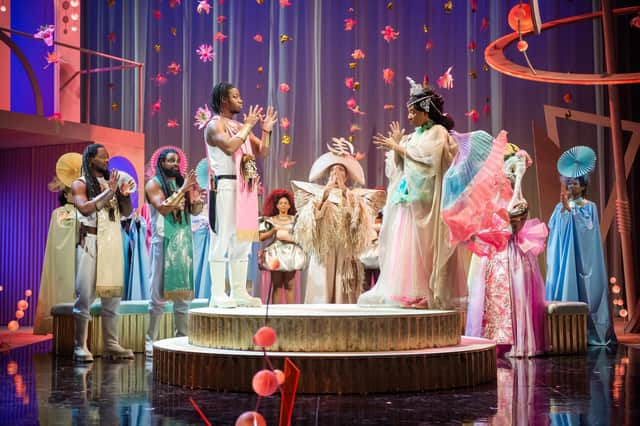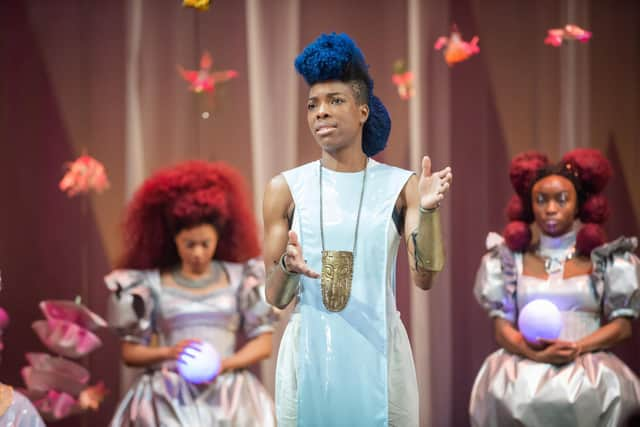Review: Afrofuturism electrifies the RSC's Much Ado About Nothing


If this represents something like a new normal for the RSC, long may it last.
The past couple of years have been especially tough for the company. Like so many, it suffered greatly under lockdown. But to this has been added particular losses. Its big-budget Robbie Williams collaboration The Boy in the Dress seemed destined to be the next Matilda, a West End hit and surefire banker; just months after it opened in Stratford, the shutters came down on the West End.
Advertisement
Hide AdAdvertisement
Hide AdThen, just as the RSC was beginning to emerge from the gloom, it was struck by a deeper tragedy: the death of the great Antony Sher, whose husband, Gregory Doran, had temporarily stepped back from his role as the company's artistic director to look after him. Difficulties have beset individual productions, too: the opening of its Christmas show The Magician's Elephant was delayed, and Michael Balogun, who was due here to play the lead male role of Benedick, had to pull out of the show just days before its first performance. Anyone who cares about British theatre should care about the RSC, and the RSC seems in need of much care at the moment.


It could have been forgiven then for playing it safe with its first full-scale Shakespeare production since the pandemic came to our shores. But what we have instead is a work of great daring and boldness, taking the widely cherished romantic comedy to places it has hitherto never set foot. It falls short only when the cast and direction fail to match the electrifying nature of the world it inhabits.
This looks and sounds as good as anything created by the RSC in recent years. Roy Alexander Weise's production is infused with Afrofuturism, described by the author Ytasha Womack as "the intersection between black culture, technology, liberation and the imagination, with some mysticism thrown in". Afrofuturism has been a thickening strand of popular culture for decades, finally breaking through into the mainstream with the Marvel film Black Panther; the look is realised here with spectacular success and will sear itself into the memory of anyone who sees it. Colours and shapes pop and sizzle and dazzle; every inch of Jemima Robinson's set is sharp and clear and radiant. It is so vivid and vibrant you can almost taste it. The costumes are designed by Melissa Simon-Hartman, who has worked with Beyoncé and on the Notting Hill Carnival; her creations are evidence of imagination and artistry operating at a transcendent level. This is matched in sound by composer Femi Temowo's pulsating, full-blooded work. In terms of sound and vision, it is a colossal, standard-setting achievement.
Given the circumstances, it is perhaps harsh to be critical of the cast. But few seemed to match the crispness and courage of the design. Ann Ogbomo gave the night's outstanding performance as Don Pedra, displaying vitality, edge and bite. Akiya Henry gave an appealing turn as a playful and snappy Beatrice. But she seemed to share little real chemistry with Luke Wilson's Benedick, while some of the play's most piercing lines were blunted by an occasional carelessness in delivery. Talented as they are, the performers perhaps needed a little more help to make the most of the comedy, and there was a sense generally that this particular performance failed to ignite.
Advertisement
Hide AdAdvertisement
Hide AdAll these leaves the production open to the criticism that it is a triumph of style over substance. Everyone at the RSC would surely say the text should be the star. Here, it was in danger of being overshadowed by the brilliance of the design. It is true that reframing Shakespeare's words in this way can give them a new vitality; many still associate him with a certain staleness and dreariness, and this production certainly puts paid to such notions. And maybe the distinction is fallacious anyway: sometimes, the style is the substance. Further, as an indication of where the RSC might be heading in its aesthetic and creative approach, this production is doubtless exciting. If future shows can match the startling visuals and sounds of this production with a similar verbal luminosity, the grand old company can look to the future with renewed hope.
* Much Ado About Nothing runs until March 12. Visit rsc.org.uk/much-ado-about-nothing to book.